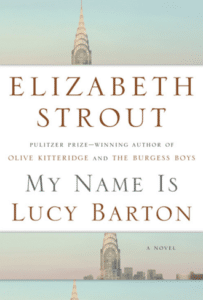Move over Olive Kitteridge: Elizabeth Strout gives us her most affecting novel yet
Author: Elizabeth Strout
“I have always depended on the kindness of strangers.”
In Elizabeth Strout’s incredibly moving new book, main character Lucy Barton considers this classic line from Tennessee Williams.
“Many of us have been saved many times by the kindness of strangers, but after a while it sounds trite… And that’s what makes me sad, that a beautiful and true line comes to be used so often that it takes on the superficial sound of a bumper sticker.”
The thread of human kindness—beginning in a New York City hospital room, moving forward over the course of marriage and motherhood, and winding back to a brutal childhood in rural Illinois—ties together My Name Is Lucy Barton, Strout’s layered and gorgeously written story of imperfect love.
This spare, quiet, haunting book begins with an ostensibly 50-something Lucy musing about a very difficult time in her life. Through the lens of memory and with a hard-fought wisdom, Lucy describes what it was like to find herself bedridden nearly twenty years prior, recuperating from a serious illness. She recalls the view from her hospital room—“All the city’s buildings seemed remote, silent, far away”—and she remembers being consumed with worry, exhaustion, and longing for her two little girls.
And then, to her shock, Lucy’s mother arrived.
This alone was a remarkable occasion, because the two hadn’t seen each other since Lucy fled their impoverished home at 18 for college. In the reverent hush of the hospital room, they spoke for the first time in years, quietly and urgently, with the Chrysler Building’s “geometric brilliance of lights” gleaming through the window. Lucy remembers, “I dozed on and off listening to my mother’s voice. I thought: All I want is this.” And yet, even as Lucy and her mother shared old stories about neighbors and acquaintances, they managed to skirt around the breathtaking dysfunction that defined Lucy’s childhood. Strout, in fact, is a master at creating profoundly uncomfortable conversations where more is conveyed through silence than through words.
My Name Is Lucy Barton is not a cliché “I suffered a bad childhood and now I resent my mother” sort of novel. It is a story about compassion, courage, and ruthlessness. It’s about acts of gentle kindness in the face of despair. Above all, it’s about resilience and how we keep the million tiny pieces of ourselves from coming unglued. “This is me, and I will not go to where I can’t bear to go,” Lucy says at the end. “I will grab myself and hurl onward through life…” Although we never get the whole picture of Lucy’s complex earlier traumas, it doesn’t matter: what the reader is left with is a sense of her bravery as she tries doggedly to take stock of where she comes from, clinging to every resource available to her.
To open Strout’s book—her best, in my opinion—is a pleasure. Savor every page, because each is alive with characters, symbolism and language that will stand the test of time.
-Laura Anne Bird
[AMAZONPRODUCTS asin=”0812979524″]
- Northwoods Author Amy Pease Interview and Book Recommendations - April 29, 2024
- Still True author Maggie Ginsberg:Interview and Book Recommendations - September 14, 2022
- When wood and words come together:A children’s picture book is born - June 30, 2022


